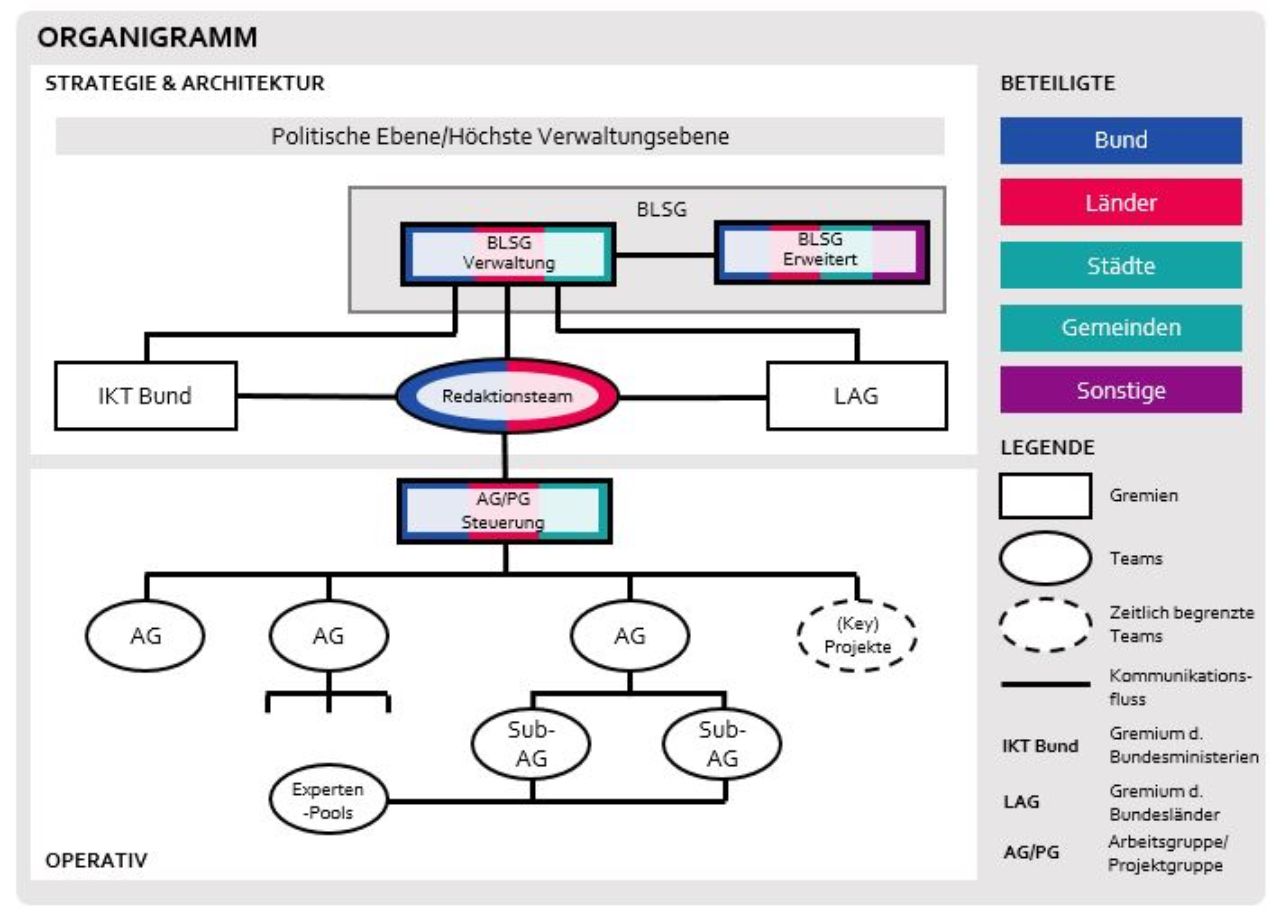Committees and organisations
For federally organised countries, the decentralised structures and responsibilities pose a particular challenge when it comes to e-government. Austria has overcome this by establishing a common strategy and then coordinating its implementation nationwide.
Central to governance within Austria's e-government is the partnership between the federal government, provinces, municipalities and local communities (for short: BLSG). This produces organisational, legal and technical standards which are developed jointly and form the foundation on which to build generic basic services and specific e-government solutions.
One such joint campaign is the Digital Skills Campaign, which is coordinated and implemented by a committee.
A committee is a group of experts that is formed to accomplish a certain task. Organisations are permanent institutions such as associations or subsidiary companies.

Coordinating committees for digital public administration services
 Quelle: BLSG/BMF
Quelle: BLSG/BMF
The BLSG (federal government, provinces, municipalities and local communities) partnership on e-government, along with the ICT-Federation committee, is one of the most important coordinating committees for digital public administration services in Austria. Members of the platform include representatives from the state and federal provinces, the Association of Towns and Municipalities, business, the Central Association of Austrian Social Insurance Authorities and the freelance professions.
The platform's activities are supervised by:
- Chief Information Officer for the state
- Management of the platform
Email: post.vii-2@bka.gv.at
The Federal Government, Provinces, Municipalities and Local Communities (BLSG) Committee
In order to implement mobile government services, it is essential to have modern, secure, flexible and scalable IT infrastructure. The BLSG cooperation ensures that organisations work together as partners on e-government. They act on the basis of jointly defined structures and processes. Jointly convened committees meet regularly and generally applicable standards are confirmed in writing and published on the reference server. Input drawn from committees outside the partnership but judged to be relevant is also taken into account. The BLSG Administrative Committee is responsible for internal agreements and resolutions, including commitments that have to be made by the administrative agencies. The Extended BLSG has a communication role. The Coordinating team is mainly responsible for coordination. The Working/Project Groups Management team is responsible for managing the activities of the working groups and groups set up for individual projects. There are currently four (permanent) working groups:
- The Infrastructure/Interoperability working group develops standardised technical architectures, describes digital processes and defines interfaces.
- The Integration/Access working group is responsible for the centralised integration of the ever-growing volume of data and also for IT networking with public institutions all over Europe.
- The Law/Security working group deals with legal issues and challenges relating to the implementation of e-government at state, provincial, municipality and community level.
- The Presentation/Standardised Data working group ensures that the e-government services on offer are accessible, intuitively usable and easily recognisable.
ICT-FEDERATION committee (IKT-BUND)
The ICT-FEDERATION committee advises the Federal Chancellor on general matters to do with Information and Communication Technology (ICT) in the context of inter-departmental ICT coordination activities, and paves the way for the following:
- Strategic initiatives
- Deciding/assessing how to approach projects
- Defining and establishing standards, interfaces, specifications
On an ongoing basis, its tasks are based on the strategic objectives of the Digital Austria platform. If required, working groups are set up to offer preliminary advice or preparatory information on topics and projects.
Email: post.vii-2@bka.gv.at
Whereas Chief Digital Officers (CDO) are responsible for driving forward the digitalisation strategy as a whole, Chief Information Officers (CIO) focus on digitalisation in public administration services, in the context of the Digital Austria platform.

Organisational units
CDO Task Force
Austria's future digital development is a complex matter. In order to coordinate aspects of innovation and digitalisation between the ministries, and the work they are doing, a Chief Digital Officer (CDO) has been appointed for each department.
The role of the CDOs is to improve the coordination of digitalisation measures between the different departments and thereby introduce more automation into their processes. This will result in better online services.
The CDO for the federal government is the Head of Section VI in the Federal Chancellery (Digitalisation and E-Government).
Digital Skills Campaign task force
The task force is being restructured as a result of the Digital Society transitioning into the Digital Skills Campaign. The headquarters for this flagship initiative of the federal government will be based within the OeAD (Agency for Education and Internationalisation), because of the many aspects of the work which relate to digitalisation and education.
A-SIT – the Secure Information Technology Centre Austria
A-SIT was founded in 1999 as a non-profit association and since then has become established as a privately funded competence centre for IT security. The Federal Chancellery is a member of the association, as are the Austrian National Bank and the Federal Computing Centre.
Since 2013, A-SIT has been responsible for the ICT security portal www.onlinesicherheit.gv.at, which was created in a joint undertaking by the administrative agencies and business and has a total of 40 partners. The portal deals exclusively with matters concerning security in the digital world and is intended to keep both lay people and professionals informed about IT-related risks and trends.
Participants
Federal Computing Centre (BRZ)
The BRZ – Bundesrechenzentrum GmbH is the leading technology partner for the public sector in Austria. The BRZ uses the latest technologies, such as big data, artificial intelligence, blockchain and robotics, in order to modernise the public administration agencies. As a full-service provider, the BRZ develops and operates flexible, automated IT solutions that meet the highest security standards.